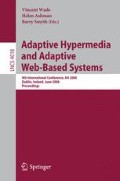Abstract
This research outline refers to the validation of interventional strategies to increase the learner’s motivation and self-efficacy in an on-line learning environment. Previous work in this area is mainly based on Keller’s ARCS model of instructional design and this study argues for an approach based on Bandura’s Social Cognitive Theory – especially the aspects of self-efficacy and self-regulation. The research plan envisages two phases: The first phase will extract rules for interventional strategy selection from expert teachers. The second phase aims to validate these rules by providing to the learner the selected strategy and observing the resulting behavior.
Access this chapter
Tax calculation will be finalised at checkout
Purchases are for personal use only
Preview
Unable to display preview. Download preview PDF.
References
Bandura, A.: Social foundations of thought and action: A social cognitive theory. Prentice-Hall, Englewood Cliffs (1986)
Brown, I.J., Inouye, D.K.: Learned helplessness through modeling: The role of perceived similarity in competence. Journal of Personality and Social Psychology 36, 900–908 (1978)
De Vicente, A., Pain, H.: Informing the Detection of the Students’ Motivational State: an empirical study. In: Cerri, et al., pp. 933–943 (2002)
De Vicente, A., Pain, H.: Validating the Detection of a student’s Motivational State . In: Mendez Vilas, A., Mesa Gonzalez, J.A., Mesa Gonzalez, J. (eds.): Proceedings of the Second International Conference on Multimedia Information & Communication Technologies in Education (m-ICTE2003). Number 15 of Sociedad de la Informacion Series, vol. Volume III (2003); Merida, Junta de Extremadura (Consejeria de Educacion, Ciencia y Tecnologia) (2004-2008)
del Soldato, T.: Motivation in Tutoring Systems. PhD thesis, School of Cognitive and Computing Sciences, The University of Sussex, UK, Available as Technical Report CSRP 303 (1994)
Dille, B., Mezack, M.: Identifying predictors of high risk among community college telecourse students. The American Journal of Distance Education 5(1), 24–35 (1991)
Heider, F.: The Psychology of Interpersonal Relations. Wiley, New York (1958)
Keller, J.M.: Strategies for stimulating the motivation to learn. Performance and Instruction 26(8), 1–7 (1987a)
Keller, J.M.: The Systematic Process of Motivational Design. Performance and Instruction 26(9), 1–8 (1987b)
Keller, J.M.: Motivational design of instruction. In: Reigeluth, C.M. (ed.) Instructional design theories and models: An overview of their current status. Erlbaum, Hillsdale (1993)
Locke, E.A., Frederick, E., Lee, C., Bobko, P.: Effect of self-efficacy, goals, and task strategies on task performance. Journal of Applied Psychology 69, 241–251 (1984)
Malone, T.: Towards a theory of instrinsically motivating instruction. Cognitive Science 4, 333–369 (1981)
McClelland, D.: Human motivation. Scott, Foresman, New York (1985)
Pintrich, P.R., De Groot, E.V.: Motivational and self-regulated learning components of classroom academic performance. Journal of Educational Psychology 82(1), 33–40 (1990)
Qu, L., Wang, N., Johnson, W.L.: Detecting the Learner’s Motivational States in an Interactive Learning Environment. In: Looi, C.-K., et al. (eds.) Artificial Intelligence in Education, pp. 547–554. IOS Press, Amsterdam (2005)
Rotter, J. B.: Generalized expectancies for internal versus external control of reinforcement. Psychological Monographs 80(Whole No. 609) (1966)
Weiner, B.: Achievement motivation and attribution theory. General Learning Press, Morristown (1974)
Zhang, G., Cheng, Z., He, A., Huang, T.: A WWW-based Learner’s Learning Motivation Detecting System. In: Proceedings of International Workshop on Research Directions and Challenge Problems in Advanced Information Systems Engineering, Honjo City, Japan, September 16–19 (2003), http://www.akita-pu.ac.jp/system/KEST2003/
Zimmerman, B.J.: Dimensions of academic self-regulation. In: Schunk, D.H., Zimmerman, B.J. (eds.) Self-regulation of learning and performance: Issues and educational applications, pp. 3–21. Lawrence Erlbaum, Hillsdale (1994)
Author information
Authors and Affiliations
Editor information
Editors and Affiliations
Rights and permissions
Copyright information
© 2006 Springer-Verlag Berlin Heidelberg
About this paper
Cite this paper
Hurley, T. (2006). Intervention Strategies to Increase Self-efficacy and Self-regulation in Adaptive On-Line Learning. In: Wade, V.P., Ashman, H., Smyth, B. (eds) Adaptive Hypermedia and Adaptive Web-Based Systems. AH 2006. Lecture Notes in Computer Science, vol 4018. Springer, Berlin, Heidelberg. https://doi.org/10.1007/11768012_66
Download citation
DOI: https://doi.org/10.1007/11768012_66
Publisher Name: Springer, Berlin, Heidelberg
Print ISBN: 978-3-540-34696-8
Online ISBN: 978-3-540-34697-5
eBook Packages: Computer ScienceComputer Science (R0)

